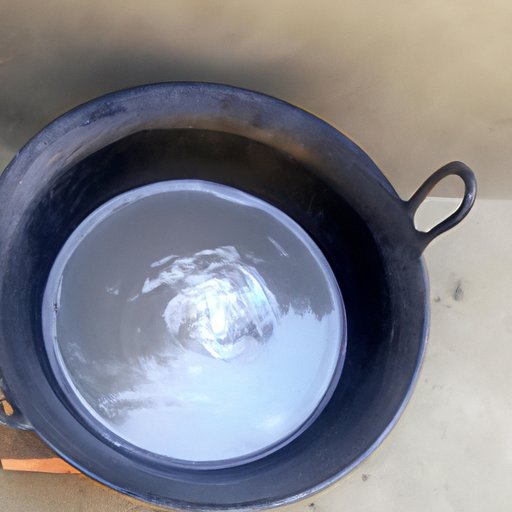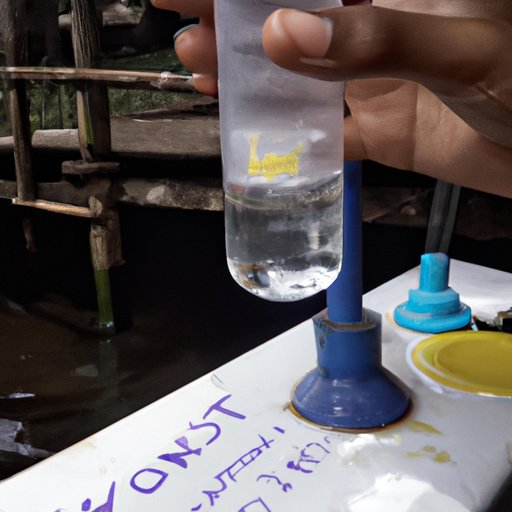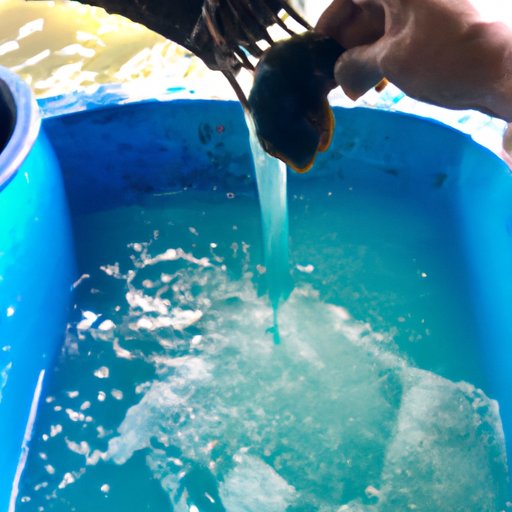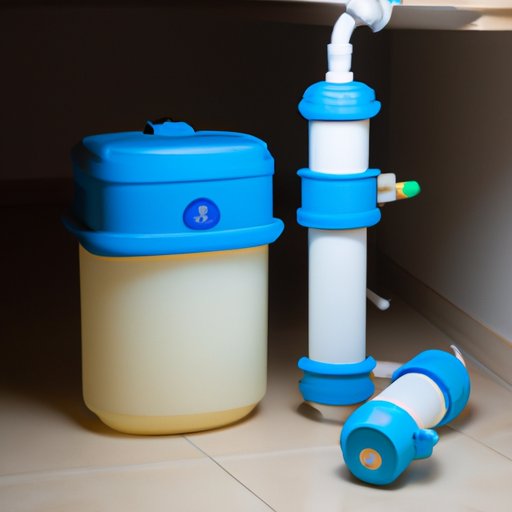Introduction
Well water is water that comes from a hole dug deep into the ground to access an underground aquifer or water table. It is typically used as a source of drinking water and is often preferred over municipal water because it is considered to be cleaner and purer. However, well water may contain contaminants such as bacteria, viruses, and chemicals that can be hazardous to your health. To ensure that your well water is safe to drink, it is important to filter it before use.
Invest in a Whole House Water Filtration System
A whole house water filtration system is a great way to filter the water coming into your home. These systems are designed to remove particles, sediment, and other contaminants from all of the water entering your home. This means that all of the water in your home will be filtered, including the water from your shower, faucets, dishwasher, and washing machine.
Benefits of Installing a Whole House Filter
The main benefit of installing a whole house filter is that it will provide you with clean and safe water throughout your entire home. It will also reduce the amount of sediment and other particles in your water, which can help to extend the life of your plumbing fixtures. Additionally, it will reduce the amount of chlorine, pesticides, and other contaminants in your water, making it safer to drink.
How to Choose the Right Filter
When choosing a whole house filter, it is important to consider the type of contaminants you are trying to remove. Different filters are designed to remove different types of contaminants, so it is important to choose one that is specifically designed for your needs. Additionally, you should consider the size of the filter and the flow rate, as this will determine how quickly the water will be filtered.
Install an Under-the-Sink Water Filter
An under-the-sink water filter is another great option for filtering your well water. These filters are typically installed directly beneath your kitchen sink and are designed to remove particles, sediment, and other contaminants from the water that flows through your faucet.
Benefits of Installing an Under-the-Sink Filter
The main benefit of using an under-the-sink filter is that it will provide you with clean and safe drinking water. It will also reduce the amount of sediment and other particles in your water, which can help to extend the life of your plumbing fixtures. Additionally, it will reduce the amount of chlorine, pesticides, and other contaminants in your water, making it safer to drink.
How to Choose the Right Filter
When choosing an under-the-sink filter, it is important to consider the type of contaminants you are trying to remove. Different filters are designed to remove different types of contaminants, so it is important to choose one that is specifically designed for your needs. Additionally, you should consider the size of the filter and the flow rate, as this will determine how quickly the water will be filtered.
Use a Portable Water Filter
A portable water filter is a great option if you don’t want to install a whole house or under-the-sink filter. These filters are small and lightweight, making them perfect for camping, hiking, and other outdoor activities. They are designed to remove particles, sediment, and other contaminants from the water, making it safe to drink.
Benefits of Using a Portable Filter
The main benefit of using a portable filter is that it is easy to carry and use wherever you go. It is also effective at removing particles, sediment, and other contaminants from the water. Additionally, it will reduce the amount of chlorine, pesticides, and other contaminants in your water, making it safer to drink.
How to Choose the Right Filter
When choosing a portable filter, it is important to consider the type of contaminants you are trying to remove. Different filters are designed to remove different types of contaminants, so it is important to choose one that is specifically designed for your needs. Additionally, you should consider the size of the filter and the flow rate, as this will determine how quickly the water will be filtered.

Boil Well Water Before Drinking It
Boiling well water is a simple and effective way to make sure it is safe to drink. Boiling water will kill any bacteria or viruses that may be present in the water, making it safe to consume. Additionally, boiling well water will reduce the amount of sediment and other particles in the water.
Benefits of Boiling Well Water
The main benefit of boiling well water is that it will make the water safe to drink. It will also reduce the amount of sediment and other particles in the water, making it clearer and more pleasant to consume. Additionally, boiling water will reduce the amount of chlorine, pesticides, and other contaminants in the water.
How to Boil Well Water Safely
When boiling well water, it is important to bring the water to a rolling boil for at least one minute. This will ensure that all bacteria and viruses are killed and that the water is safe to drink. Additionally, it is important to let the water cool before consuming it, as boiling water can scald your mouth and throat.

Test Well Water Regularly for Contaminants
Testing well water regularly is an important step in ensuring that it is safe to drink. Testing can reveal the presence of bacteria, viruses, and other contaminants that may be present in the water. Knowing what contaminants are present in your well water will allow you to take steps to remove them and make the water safe to drink.
Benefits of Testing Well Water
The main benefit of testing well water is that it will allow you to determine if there are any contaminants present in the water. Knowing what contaminants are present will allow you to take steps to remove them and make the water safe to drink. Additionally, it will give you peace of mind knowing that the water you are drinking is safe.
How to Test Well Water
When testing well water, it is important to use a certified laboratory that specializes in water testing. The lab will collect a sample of the water and test it for a variety of contaminants. Once the results are available, they will provide you with a report that outlines what contaminants are present and what steps you need to take to make the water safe to drink.
Purify Well Water with Ultraviolet Light
Using ultraviolet (UV) light is another way to purify well water. UV light is effective at killing bacteria and viruses that may be present in the water, making it safe to drink. Additionally, UV light will reduce the amount of sediment and other particles in the water.
Benefits of Using Ultraviolet Light
The main benefit of using UV light is that it will make the water safe to drink by killing any bacteria or viruses that may be present. It will also reduce the amount of sediment and other particles in the water, making it clearer and more pleasant to consume. Additionally, using UV light will reduce the amount of chlorine, pesticides, and other contaminants in the water.
How to Install an Ultraviolet Light
Installing an ultraviolet light is relatively simple. First, you will need to install the UV bulb in the housing unit and connect it to a power source. Then, you will need to connect the housing unit to your well water pipe. Finally, you will need to set the timer for the UV light to turn on and off. Once the UV light is installed, it will automatically purify the water as it passes through the unit.

Treat Well Water with Chlorine Bleach
Treating well water with chlorine bleach is another effective way to make sure it is safe to drink. Chlorine bleach is effective at killing bacteria and viruses that may be present in the water, making it safe to drink. Additionally, chlorine bleach will reduce the amount of sediment and other particles in the water.
Benefits of Treating Well Water with Chlorine Bleach
The main benefit of treating well water with chlorine bleach is that it will make the water safe to drink by killing any bacteria or viruses that may be present. It will also reduce the amount of sediment and other particles in the water, making it clearer and more pleasant to consume. Additionally, using chlorine bleach will reduce the amount of chlorine, pesticides, and other contaminants in the water.
How to Treat Well Water with Chlorine Bleach
When treating well water with chlorine bleach, it is important to use the correct amount. Generally, you will need to add 1/4 teaspoon of bleach per gallon of water. You should wait 30 minutes after adding the bleach before consuming the water, as this will allow the chlorine to fully disinfect the water.
Conclusion
Filtering well water is an important step in ensuring that it is safe to drink. There are a variety of ways to filter well water, including installing a whole house water filtration system, installing an under-the-sink filter, using a portable filter, boiling the water, testing the water regularly, purifying the water with ultraviolet light, and treating the water with chlorine bleach. By taking the proper steps to filter your well water, you can ensure that it is safe to drink and of the highest quality.
Summary of Steps for Filtering Well Water
To filter well water, you should invest in a whole house water filtration system, install an under-the-sink filter, use a portable filter, boil the water, test the water regularly, purify the water with ultraviolet light, and treat the water with chlorine bleach.
Benefits of Properly Filtering Well Water
The main benefits of properly filtering well water are that it will make the water safe to drink, reduce the amount of sediment and other particles in the water, and reduce the amount of chlorine, pesticides, and other contaminants in the water.
(Note: Is this article not meeting your expectations? Do you have knowledge or insights to share? Unlock new opportunities and expand your reach by joining our authors team. Click Registration to join us and share your expertise with our readers.)
